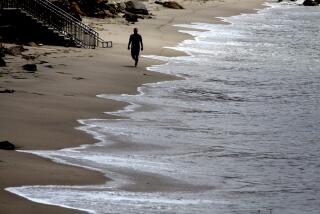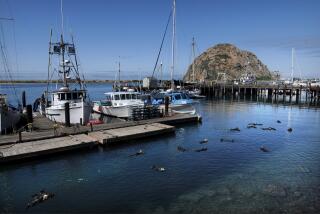Red Tide Siege Adds to Beach Problems
- Share via
As cleanup crews continued to advance against the lingering remnants of oil on county beaches Friday, the first waves of a red tide rolled in, complicating the danger to shellfish and people who eat them.
A red tide, which is caused by a concentration of microscopic plankton, can poison shellfish and other marine life but is usually not severe enough to harm swimmers, officials said.
But combined with the possibility of oil on the ocean floor, the red tide has created a health hazard to anyone eating shellfish taken from the waters near where the tanker American Trader spilled 394,000 gallons of oil Feb. 7 after apparently puncturing its hull on its anchor.
County health officials warned against eating the shellfish, calling the species “unsafe for human consumption,” pending tests.
On the beach, cleanup crews continued to make progress at removing oil from county beaches and jetties. All beaches north of the main Bolsa Chica lifeguard tower were open by Friday morning, and a section of coast from Magnolia Street to Beach Boulevard in Huntington Beach were scheduled to open at 6 a.m. today.
The cleanup crew, which Friday numbered 220 workers, will continue to scour rocky areas through the weekend, but their efforts may be hampered by a drizzling rain forecast for today. The rain is expected to taper off by afternoon, however, leaving light winds and moderate swells behind.
“We’re making progress,” Huntington Beach Marine Safety Capt. Bill Richardson said. “There’s some beach left closed, but they’ve reopened a lot.”
He said crews are advancing at a rate of about 50 yards a day at the Bolsa Chica bluffs, but the work is laborious, with workers backtracking over areas already cleaned to be sure that more oil has not soiled them.
By noon Friday, British Petroleum officials said area governments had reopened 6 1/2 miles of coastline, including areas in Huntington and Newport Beach. That left 7 1/2 miles of closed beach, including a long stretch from Magnolia Street south to the Newport Pier and a smaller piece from Golden West Street to the main Bolsa Chica lifeguard tower.
Most areas that remain closed are restricted because of cleanup efforts along jetties and rock groins. Those areas are harder to clean than beaches because access to them is more difficult, and crews must often work in the water.
“There’s a lot of stuff stuck up in between the rocks,” Richardson said. “It could be some time before we get all of it.”
Beaches near the groins will remain closed during cleaning, he added, because oil is dislodged by the process.
Meanwhile, Roger Kemple, senior vice president of Golden West Refining, which owns the offshore mooring where the accident occurred, said the company is being hurt by restrictions placed on the facility. Because the American Trader accident is still under investigation, the Coast Guard has indefinitely prohibited tankers with drafts deeper than 20 feet from using the mooring, which effectively limits traffic there to barges.
“In the short term, that’s acceptable to us, but in the long term, if it continues, it will create quite a hardship,” he said.
Kemple said the company’s concerns have been relayed to the Coast Guard, which he said has not responded.
More to Read
Sign up for Essential California
The most important California stories and recommendations in your inbox every morning.
You may occasionally receive promotional content from the Los Angeles Times.











